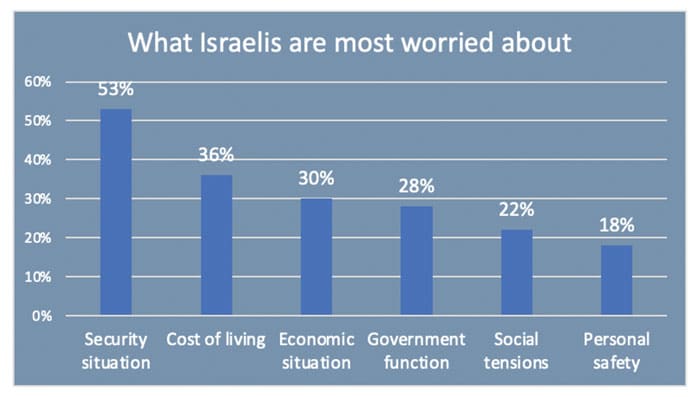
Humility is not a common virtue among policy makers and diplomats. Had it been more common, U.S. policy makers would be less inclined to give Israel advice on the way forward in Gaza. Had it been more common, U.S. diplomats would be less confident as they tell Israelis what’s the course they ought to take.
There had been reports in recent days, that the Biden administration wants Israel to accept a tentative plan that includes three main components: Letting the Palestinian Authority take over Gaza, normalize ties with Saudi Arabia and agree to signal in ways both verbal and practical its commitment to a two-state solution. There had also been reports that Israel finds this formulation hard to swallow, for both political and fundamental reasons. And there have been reports – there are always reports – about a supposed tension between the two countries.
The US was wrong in its assessment of the Arab spring, was wrong in its assessment of the Syrian civil war, was wrong in its assessment of its ability to engage with Iran. Time and again it erred by being too optimistic.
The reports are correct, if overhyped. The American plan is half-baked at most. Israeli frustration is a reflexive habit. And tension is to be expected. These are tense times. And yet, one wonders: How about some lessons from a fairly recent past? In 2005 the U.S. pressured a frustrated Israel to allow elections in the Palestinian territories. The result was the rise of Hamas. In 2006, the U.S. forced Israel to restrain its attack on Lebanon. The result was a less-than-ideal deterrence of Hezbollah. The U.S. was wrong in its assessment of the Arab spring, was wrong in its assessment of the Syrian civil war, was wrong in its assessment of its ability to engage with Iran. Time and again it erred by being too optimistic. And yet, no humility is to be found as a new generation of Americans descend on Israel carrying a suitcase packed with advice.
Israel too has a bag filled with strategic mistakes. But Israel is the one paying dearly for its mistakes. And sometimes for America’s too. When the Bush administration wanted the Palestinians to go to the polls because of its belief in Middle East democracy, Israel had to submit – and live with the consequences. The same is true today: The Biden administration has a plan for the future of Gaza. Is it a good plan? A bad plan? In both cases, Israelis are the one who’d have to live with the consequences.
You might say: Since America supports Israel financially and in many other ways, it should have a say. A beggar can’t be a chooser. That’s true: There’s nothing more annoying – to me as well as to you – than Israelis who take the support and reject the idea of Americans having the right, and maybe the duty, to give advice. The U.S. has a dog in this fight, it has a stake in this enterprise. The U.S. is entitled to have a say. The issue isn’t the idea of giving advice, the issue is the quality and validity of the advice, and the obvious absent of humility considering past failures to give solid advice.
I assume the U.S. truly aims to better the situation. I assume it strives to guard its own interests, one of which is for Israel to remain strong. If that’s the case, and I see no reason to doubt it, how about trying to achieve it Israel’s way? How about betting on Israel’s ability to carve a way out of the dire situation with outside support but not outside advice? If giving advice is about American ego, I understand such suggestion is hard to accept, but if it’s about finding the best way forward, couldn’t it also be an option?
And it’s not that I don’t see the logic behind the U.S.’ advice. In many ways, I even agree with it. I also think that Israel has no better alternative for Gaza than the Palestinian Authority. I also support (all Israelis do) normalization with the Saudis. And as for the two-state solution – I’ll consider it as pragmatic a plan as the phrase “speedily send us your righteous messiah of the House of David” from the Prayer for the Welfare of the State of Israel. Both are statements of faith, not a recipe for policy. And ironically, both slogans (“Messiah now” and “we must work for a two-state solution”) traditionally strengthen the power of the Israeli right.
The problem seems to be, that the U.S. seriously think that talking about a two-state solution – now! So soon after the Oct. 7th pogrom – is a good idea. Just think about it for a second: Israel was brutally attacked, and the Biden administration wants a response that would make this attack seems worthwhile to many Palestinians. They rejoiced when Israeli blood was spilled, and will now be rewarded for it. Does it make sense? Let’s try this logic with events that Americans better understand. How about “Pearl Harbor absorbed a severe blow – it’s time to accept Japan’s occupation of China”. Or maybe this one: “The Twin Towers were destroyed – it’s time to give Al-Qaeda a state”.
Does this sound reasonable to you? I bet it doesn’t. And while we can spend many hours explaining why these two examples are completely flawed – and insisting, rightly, that there is no comparison – this is still the tune Israelis hear, when the two-state solution is being offered to them with straight face at this point in time.
Something I wrote in Hebrew
The government is slated to raise the salaries of teachers in Haredi schools. Here is what I wrote:
You might say: But you’d oppose this budget even if there had not been Oct. 7th, and even if more money had not been needed for defense. True. I would. There are reasons to oppose this transfer of funds in all times. But the timing still makes a difference. It makes this move much more annoying, and it also makes the price of this move much more expensive. The money being transferred now, for no reason other than the desire to please the ultra-Orthodox parties, will come at the expense of very important things. In the coming years, Israel will be required to set its financial priorities more tightly, in order to strengthen its defense, which means that the money currently wasted on salary raises for Haredi teachers will not come at the expense of luxuries, it will come at the expense of really important things.
A week’s numbers
IDI asked Israelis to mark the two things that they deem most worrying in the short term:

A reader’s response:
Peter Weinberger writes: Hamas will always be able to fire rockets into Israel. Israel needs to define victory in a way that is achievable and tangible. My response: An effective ruler in Gaza would be one that prevents such firing.
Shmuel Rosner is senior political editor. For more analysis of Israeli and international politics, visit Rosner’s Domain at jewishjournal.com/rosnersdomain.























 More news and opinions than at a Shabbat dinner, right in your inbox.
More news and opinions than at a Shabbat dinner, right in your inbox.